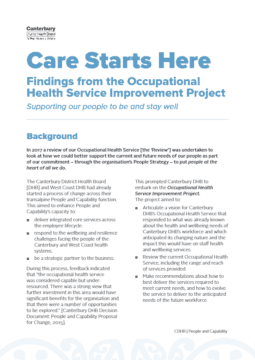In 2017 a review of our Occupational Health Service was undertaken to look at how we could better support the current and future needs of our people as part of our commitment – through the organisation's People Strategy. Central to the Strategy is the concept that Care Starts Here, with our people.
The Review involved a literature scan of related studies, an online survey of our workforce [1419 respondents], and a series of in-depth interviews.
Survey findings
Key findings from the survey included:
-
Musculoskeletal and mental health conditions are prominent among our people who have a long-term condition.
-
The support provided to those with an injury compared with those with ill health [physical and mental] is seen as inequitable
-
Our people identify a need to strengthen our support for their psychological health
-
Sickness absence is increasing across our organisation
-
Confidential support services are valued by our people
Key areas we need to develop
Our vision is for an Occupational Health Service which provides high quality support for the Canterbury DHB workforce to be and stay well. Achieving this vision will require:
-
Increased focus on prevention and health promotion
-
A more equitable approach to provision of support to our people experiencing mental ill health, physical ill health, and injury, including the possible adoption of a case management to illness as well as injury
-
Increased emphasis on supporting our people with mental ill health at work
-
Increased use of data to inform service delivery activity and to support organisational productivity.
-
A more integrated approach, partnering more closely with Community Public Health, primary care, and third party service providers.
-
Appropriate resourcing
Next steps
-
In February 2018 Canterbury DHB's Executive Management Team [EMT] received the Report. EMT endorsed the Report's recommendations and approved resourcing to establish a programme of work to support the Occupational Health Service to evolve towards the vision for the future service and to better enable it to support our people to be and stay well.
-
The programme of work will set out which actions will be taken and set timeframes for their implementation, and is being overseen by an Advisory Group who had their first meeting on 14 March, 2018.

